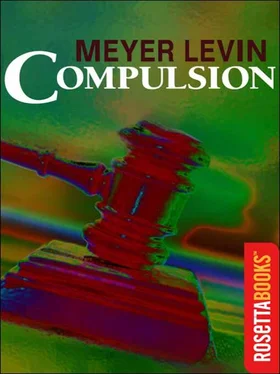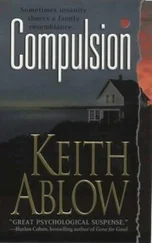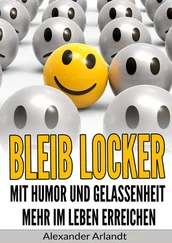Judd shut it off. To fill the mental void came the image from yesterday. He had not counted on the blood. In all the months of planning, he had seen the thing as perfectly clean. They had even talked of it as neat, clean, talked of using the ether. And he had taken along the ether, yesterday morning, as if for his bird collecting, taken two whole cans, enough for a thousand birds. And put the two small cans into the side pocket of this car… Judd’s mind leaped back to the immediate scene – the cans! Had he forgotten them there, since they hadn’t been used? No, he knew for certain he had taken them out and placed them back on the shelf in his room. Late last night. Yet it was all Judd could do now to restrain himself from opening the door and checking.
At least, he noted, this sudden scare had ended his nausea… And why hadn’t they used the ether? To put the boy cleanly to sleep, and in his sleep to do as planned – in his deep sleep to slip the rope around his throat, Artie and he each holding an end of it – to pull, with equal force, equal participation, forever linked in that way, he and Artie. Instead, it had all happened so quickly once the kid was in the car. It had happened while Judd had still been feeling that perhaps the whole final deed would not take place at all… Could Artie have sensed this last hesitation in him, and jumped the deed the way you ought sometimes to jump a girl before she can gather her resistance?
The rental man was putting his head inside to check the mileage. So outside nothing showed. They had washed it well enough. But it was a damn stupid thing. That damn stupid Emil had to come along offering the Gold Dust. It was a damn stupid thing to have taken the car into the driveway to wash. For that, Judd blamed himself. Last night’s washing should have been enough without the second going-over in the morning. Modern version of Lady Macbeth… out, out, damned spot!
What was the use of taking all the trouble to establish a fake identity, with hotel registrations and all that stuff, so as to rent a car and not use your own car, and then the next thing you do is let some dumb Swede chauffeur see you with it and tie you up with the strange car?
The only safety was, the question must never arise. For right now this car was being returned to anonymity; tomorrow it would be out in someone else’s hands.
“Fifty-three miles, Mr. Singer,” the rental man said. “Want to check it?”
Judd smiled, feeling refreshed. How natural the name sounded! This part-the carefully established false identity, the car – it was all his idea and it had worked perfectly. Artie would have to give him credit for that much. “What about the gas I bought?” Judd said. “I filled up the tank.” And he wished Artie had come in with him to savour this moment, to observe his complete self-possession. It was all there, the evidence of their deed was registered in the atoms of the vehicle, this inanimate object had experienced what they had experienced – the man had it standing before him as Judd stood; yet he could tell nothing, from either.
“Did you get a slip for the gas?”
“No, I didn’t bother, but you can see it’s practically full.” He had filled it at home from the pump in the driveway just before they had started out to find the victim; at least Emil hadn’t walked in on that.
With an air of creating good will in a customer, the man agreed to allow for a couple of gallons. “Call on us again,” he said, his upper lip folding back over his toothbrush moustache in a smile.
“I will,” said Judd, wishing Artie could hear that one.
“What took you so long?” Artie demanded before Judd could climb into the roadster.
“I made him give me an allowance for the gas.”
Instead of laughing, Artie snapped, “The longer you gab the better he knows you, you sucker.” Judd was getting in from the driver’s side, making Artie push over. And in that instant, in Artie’s anger, Judd suddenly felt the failure of the entire venture. It came over him blackly, fully – a grief, an anguish that nearly brought tears.
It was all closed now. They had turned in the car. The whole thing was a failure. The killing itself had been wasted. Even if the killing had been a necessary waste, an experiment, there remained the death of the thing itself. The whole thing had represented a plan, an entity, perhaps a poetic unity, a flower of evil, a union between Artie and himself. And it was dead.
What had killed it? What was it really that had gone wrong?
Judd pulled away from the curb, but Artie, in the midst of lighting a cigarette, made a motion for him to stop, and jumped out to a news-stand – a new headline had caught his eye: MILLIONAIRE BOY SLAIN. Artie stood there on the pavement, reading. Judd honked. Still reading, Artie got into the car.
“How did they find out who he was?” Judd asked.
“Some stupid sonofabitch reporter went out there-”
Judd parked part way up the block and leaned over to read with Artie. His eye skipped down the column, and together they saw the line about the glasses: “Desperately awaiting word from the kidnappers, the Kessler family at first refused to believe that the boy found dead in the culvert was Paulie, because the police reported that the dead boy wore glasses. Then it was learned that the glasses had been picked up in the weeds, and placed on the boy by his finders. The glasses, police now believe, were dropped by the murderer, and should prove a valuable clue.
Artie turned his face full on Judd. His cheek was twitching, high up under his eye. “You bastard sonofabitch, you had to go and spoil it.”
Automatically, Judd’s hand had gone to his breast pocket, though he already knew that it was so: this was the flaw. And a curious thrill went all through him, the first complete thrill of the entire experience. It was not the dark thrill he had imagined he might feel at the height of the deed itself, as at a black mass, nor was it the elative thrill he might have felt had the package been tossed from the train. It was a thrill as from some other being within himself; it was a gloating.
He told himself that it was a thrill to the challenge that now existed, the challenge to outwit pursuers, even when they possessed a clue.
But why had the glasses been in his coat pocket at all? He speculated on causation. He had scarcely used the glasses during the past few months, not even for studying. It must have been weeks ago that he had stuck them in this coat pocket, and, hardly wearing this suit, he had forgotten they were there. Then what had made him choose this suit yesterday?
And when could the spectacles have dropped out? Had it happened when he was bending over, in the back of the car, the glasses dropping into the lap robe half wrapped around the boy? Judd saw again the boy entering the car, the quick blows, the suffocation – that part of it already done, so hastily, so irretrievably done before you could decide finally whether or not to do it. Then driving through the Midway, past the university, through the park, south to the edge of the city, then stopping at a hot-dog stand, leaving him in back there while they ate the franks, then cruising, then parking on the little side road back of a cemetery, waiting for darkness. And both climbing into the back seat, and Artie’s high-pitched, “Let’s see.”
Like kids in a dark closet, to do the most awful imaginable forbidden things. Huddling down. Had the glasses fallen out then, on to the robe? Artie beginning to undress the body, pulling off the knee pants. And Judd in himself wondering at himself, now that the opportunity had come to test the farthest human experience, dispassionately, as in a laboratory. Remembering the untried experiences from the list in Aretino’s Dialogues . Artie’s saying, almost petulantly, “He’s dead all right. Getting stiff.” Then all at once, tumultuously, himself losing interest… Now Judd shut off the dark image. The glasses, only the glasses – were they glinting there, fallen on the robe?
Читать дальше












